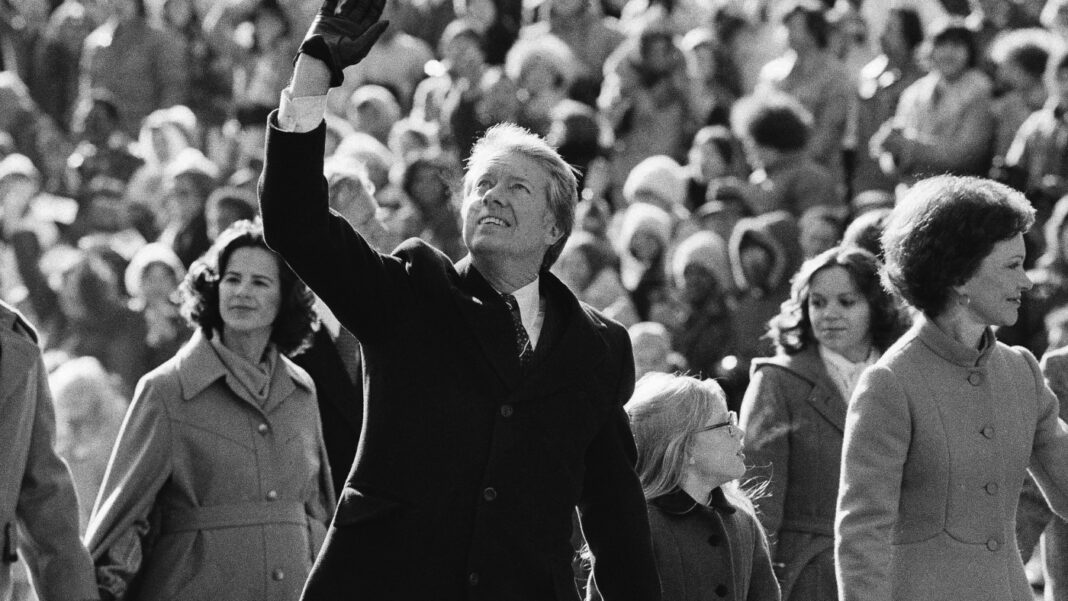
President Jimmy Carter waves to the crowd while walking with his wife Rosalynn and their daughter Amy along Pennsylvania Avenue from the Capitol to the White House following his inauguration, Jan. 20, 1977, in Washington.
Suzanne Vlamis/AP
hide caption
toggle caption
Suzanne Vlamis/AP
President Jimmy Carter was an outlier in more ways than one.
Born and raised on the humble farmlands of southern Georgia, Carter grew up without running water and used an outhouse. He played with the Black children in his community during a time of intense racial segregation in the U.S.
Despite societal norms and political pressure, Carter often followed his instincts and did what he believed was right, according to Kai Bird, biographer and author of The Outlier: The Unfinished Presidency of Jimmy Carter.
“He was always the smartest boy in the room in school,” Bird said. “And as president, he always thought he was the most intelligent, most well-read person in the room. So, he was faced with a dilemma, and that’s because he had ambition.”
Carter was a Southern Baptist, who believed pride was a great sin.
“He knew he had a lot of pride and ambition,” Bird said. “And so the way he reconciled this was to say to himself, ‘I will achieve power. I will do whatever I can to win the presidency or the governorship. And then when I do, I will do the right thing regardless of the political consequences. I will be righteous.'”
Carter served one presidential term as the 39th president of the United States. His term was filled with remarkable highs, like leading peace negotiations between Israel and Egypt, and irreversible lows, like his inability to repair a failing American economy. But, true to form and unlike other presidents, Carter excelled after his presidency, winning a Nobel Peace Prize for his humanitarian and peace initiatives.
Even in the last year of his life, Carter continued to mark milestones. This year he celebrated his 100th birthday — becoming the oldest living former president — and met his goal of voting for Kamala Harris in the 2024 presidential election.
NPR’s Steve Inskeep spoke to Bird about Carter’s legacy as a politician, president and person.
This interview has been edited for length and clarity.
Steve Inskeep: Why was [Jimmy Carter] an outlier, as you called him?
Kai Bird: He was an outlier in all sorts of ways. He grew up in south Georgia playing as a child with African-Americans. He was the only white boy in Archery, a tiny hamlet outside of Plains, Ga. So, that’s the most unusual childhood. He grew up in very Spartan circumstances, no running water, an outhouse. He sort of was a president still from the 19th century. And then as a politician, he was a southern white man who was a liberal, and yet he was also a politician who cared not for the political consequences of his decisions. He just always wanted to do the right thing. So, he was an outlier. He was a very unusual kind of politician.
Inskeep: I learned from your book that he grew up in this very rural way, but also was kind of an elite family locally, because his father had a number of Black workers and this was part of the unequal or patriarchal society that he then tried to change or improve.
Bird: Yes. You know, he grew up in deep segregation, a time when the South and much of the country was still dealing with racial segregation. And yet he empathized with the Black people that he grew up with. And when he became governor, he announced in his inauguration statement that the time for racial discrimination is over. Shocking his audience.
Inskeep: In 1979, he gave a famous speech about a crisis of confidence in America, doubt about the meaning of our own lives. I’m quoting his words now, ‘A loss of unity, of purpose for our nation, the erosion of our confidence in the future.’
This was well received at first, as you write. It was then criticized. Does it seem somehow prescient today?
Bird: Yes. He went on in that famous speech to say something quite extraordinary, saying too many of us now tend to worship self-indulgence and consumption. Now, he’s taking a page straight out from Christopher Lasch’s The Culture of Narcissism, which he had just recently read. But this also spoke to his Southern Baptist sense of morality and righteousness. And it was a sermon. And I think it’s very prescient today, because we’re still living in a culture, a political culture that is quite narcissistic.
I think history will judge Jimmy Carter as a president well ahead of his times. He’s, I would argue, the most intelligent and hardworking and decent man to have occupied the Oval Office in the 20th century.
Obed Manuel edited the digital story.


